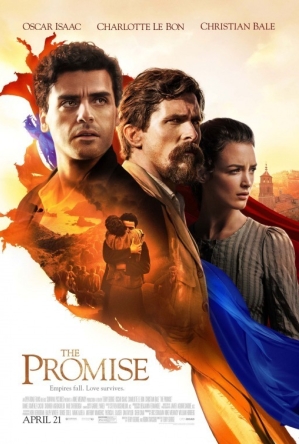Ralph Winter is behind some of Hollywood's biggest films, from 1984's Star Trek: The Search for Spock to the wildly popular X-Men franchise. Most recently, the devout Christian - who's also behind several faith-based films - oversaw the historical drama The Promise, starring Christian Bale, Oscar Isaac, and Charlotte LeBon.
From writer/director Terry George, The Promise is a powerful, eye-opening film dealing with the mass killings of 1.5 million Christian Armenians by the Ottoman Empire between 1915 and 1922. Despite Pope Francis' description of the World War I-era slaughter as the first genocide of the 20th century, the Turkish government has maintained that the Armenian genocide - also known as the Armenian Holocaust - never occurred.
In an exclusive interview with The Gospel Herald, Winter opened up about the forthcoming drama and shared why he believes Christians should join him in bringing to light the horrors of the Armenian genocide.
The Promise hits theaters across the country on April 21.
GH: Why did you decide to get involved with The Promise?
RW: I live in Glendale, in a very large Armenian community, and ironically my birthday April 24, the same day that commemorates the genocide. When they found that out in the interview they said, "you're in." (laughs). But, really, when I read the screenplay about the Armenian genocide and the love story, it really captured my attention. I was privileged to be part of the team that brought this to the screen.
The challenge (the filmmakers) had is that they didn't have the infrastructure of a studio to help them an protect them. They needed someone to do that, and that's why my name came up. Now, we've all now become friends and we've made it through successfully. It's also a high-profile topic that was also challenging. We were caught in some security and we were on with the state department when we traveled to be sure that we weren't stepping into any areas that would be problematic for our cast and production and subject matter, because it's such a hot topic around the world. So, it was challenging, but I love those challenges. I've done very large movies and I've done very small movies. They're all fun in different ways.
GH: How aware were you of the Armenian Genocide prior to your work on this film?
RW: I'd marched in some of the genocide parades in Hollywood and in Los Angeles with Dean Cain and other folks to try to heighten that awareness. I have a lot of Armenian friends and Armenian members of the church that I was attending at the time, and I think that we need to remember what happened and help them they get the recognition they deserve.

GH: "The Promise" is about religious persecution, and that's something we're still seeing around the world. In your opinion, why is there such a general apathy toward religious persecution today?
RW: Sometimes it might be that we get overexposed to it; it just becomes another part of the nightly news broadcast. It's also because we haven't engaged in those stories. My Armenian friends are very engaged, it is a passionate and vocal topic when I'm with them. It's probably about a deeper question of, why are we apathetic about a lot of things?This was not just religious persecution, it was economic persecution and class persecution. The first ones rounded up were the intellectuals and wealthy. Lately we've seen some great movies about persecution, with Hacksaw Ridge and Silence. Sometimes it takes some of these dramatic stories to resonate deeper than just a news report to affect people.
GH: This film has been praised by a number of high-profile members of the Armenian community. What does that mean to you?
RW: We had a screening last night at Hollywood premiere, and Cher and Kardashians were there. So, it definitely reaches a segment of the Armenian community - it's not one monolithic group, but rather a lot of people who follow different personalities. We're trying to leverage those relationships that we have to try and get, you know, certainly the Armenian community to come see the movie, but on a broader level, the movie's not going to be successful if just the Armenian community shows up. We need to reach a larger audience, so we're doing that on social media and other old-fashioned routes, too.
GH: What do you want audiences to feel when they leave The Promise? How do you hope it impacts them?
RW: Primarily I want audiences to be emotionally impacted by the movie; I want them to say, "I didn't know about that, I didn't know the depth of that, and I didn't know I would feel this way." I think that's primarily an emotional reaction. I hope they retell the story and about this genocide, that it's something we need to pay attention to, or it's simply going to repeat itself again and again. Isn't that part of our job as Christians - to fight for justice and mercy? It fits into that framework, but throughout the film, the Christians in the movie are praying for mercy and justice, and reaching out and crying out to God. I think it'll be impactful for Christians to watch.






